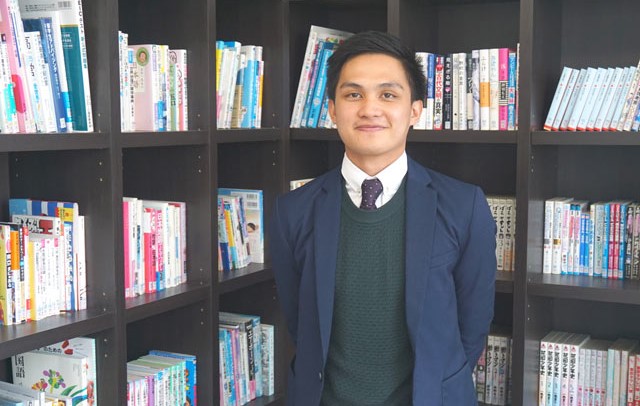Japanese Job Interviews: Long Process, New Chances

by Madelaine
Can you find a job in Japan after just two years of study? We talked to Kevin about study schedules, the drawn-out Japanese job interview process and the importance of nonverbal communication.
Read on to learn about:
✔ Making time to study
✔ Panel Interviews
✔ Why gestures matter
✔ Tough questions
✔ Why you should get a part-time job
✔ Unorthodox work schedules
✔ Why connections matter
and much more!
コンテンツ
Kevin’s Profile
Name: Kevin (26)
Country: Philippines
Major: Business/Office Administration, Philippines
Industry: IT
Japanese level: N2
Work status: New graduate
Job-hunt: 1 job fairs, 3 applications, 9 interviews, 2 job offers
Q: Congratulations on your job offer! What made you decide to come to Japan in the first place?
I don’t precisely know why. Since I was a kid, I liked watching anime and drama. I also love ninjas, that’s what first made me interested in Japan.
When I was in my first year, we didn’t have that much money. My father is a drama director, but the salary was not enough to send me to school and my mother is an overseas worker, she is in China now. So, I applied for scholarship and luckily received a one-year scholarship from Toyota.
After the first year I stopped for four semesters and got a part-time job at a mall. There I saved money and after four semesters I went back to school. Toyota had sponsored me to get an Accounting major, but I really hate numbers that’s why from the second year I shifted to Business Administration.
I decided to come to Japan when I was working at the mall. I have a friend who was working at the same company, and she had been working in Japan. We started talking about things like what Japanese culture is like and that gave me the idea that maybe I could go to Japan too.
The Japanese Skills
Q: And that’s when you started studying Japanese?
I started studying Japanese in 2018. My city only had very few Japanese schools, but my friend introduced me to one school. At that time, I was working Monday to Friday from 9am to 6pm with overtime sometimes and on Saturday, Sunday I had to go to school. This schedule was hard for me because I didn’t have any rest and it was difficult for me to study because when I went home, I was really tired and just wanted to sleep. I did it for three months. Afterwards I moved to Japan to study Japanese at Linguage Japanese Language School in Tokyo.
Q: How was your Japanese level when you came to Japan?
When I came to Japan, I was at N5 level, but I didn’t know how to communicate well. Even just going to the convenience store was difficult. For example, when I wanted to order at restaurants, I had to use gestures so that they can understand what I mean.
Q: How much did your Japanese improve since coming to Tokyo?
I came here in October 2018. Then I took the N3 in summer 2019 and in December I took the N2, but I don’t know the results yet. Now we are studying in between N2 and N1.
Q: Do you have a good feeling about the N2?
Kevin: I think I failed (laughs). The preparation time was too short. When I got here the studying process was too fast.
“In only 1 month we studied and reviewed everything for N5.”
And then we started N4. At that time, it was very hard because my Japanese speaking skills were not that good. But thanks to the teachers at my school I could do it because they helped me a lot.
After three months they told me that I should try to take N3 by July. For me it was too impossible. My friends from other schools studied N3 materials for about one year and they didn’t pass. Still, it was a new challenge and I thought, why not try and I bought some books and I started to study by myself.
The Interview Process
First attempts
Q: At what point did you start applying to companies?
Once I passed N3 I submitted 2-3 applications and interviewed with two companies. One was a marine products company and the other company was selling goods from the Philippines in Japan. To improve my knowledge and Japanese skills I hoped I could start at the marine products company, but I failed after 2 or 3 interview rounds.
Q: If you went to 3 interviews that must mean you almost made it to the end!
Yes, the first interviews were one-on-one but for the last interview I met the manager and the owner of the company. It was my first time to have multiple people interviewing me which made me very nervous.
Panel Interview
Q: Where there any signs that it wasn’t going well?
I was really nervous, and it was a panel interview. I didn’t understand what they wanted and when I asked if they could say it in an easier way, they just said that it already was a simple question…
“There were questions I really couldn’t understand. Even now, recalling them, I still don’t know what they were asking for.”
Q: After having had this experience, how would you recommend handling such situations?
Maybe if I had studied more and practiced it would have been better. Before the interview I should have gone through more questions and practice. Because practice really means a lot. Going through common interview questions is useful too, I think it will help you answer more. And business vocabulary is also good, especially being familiar with words relevant to the industry.
The Opportunity
Q: So, you will be starting at the Philippine products company?
I signed the contract and started at that company a few months ago, working part-time while attending school. But then I got another opportunity! (laughs) Actually, the Philippine products company was quite good. I could have introduced my country’s goods to Japanese people who have no idea about Filipino products.
But in the end an IT company offered me a job and I took the opportunity. I had spent a lot of time studying in Japan and I wanted to be more proactive about learning the Japanese language, and also they offered good benefits.
“The company told me that they will support me to study to become an IT engineer.”
I knew someone from the Philippines who was a student here before and he told me about this position that asked for someone who could translate English to Japanese with N3 level.
He said to me: “You have a job right, but do you have any interest in IT?” In my country the job needs to be related to your background, so I replied that I am interested but I don’ know anything about IT because of my major. Here, they invited me to four interviews, and I am blessed that I passed.
Q: So your new job is going to be a big change from what you have been doing so far?
Everything is new for me because my major was something completely different and I don’t have any IT experience at all. But I love challenges and I saw this as a big opportunity for me.
The Work
Q: What will your responsibilities and positions be at the company?
The company is an IT company that focuses on networks. My first job will be to answer phone calls from customers and translate their issues from English to Japanese to forward to the IT people and then translate their solutions back from Japanese to English. At the same time, I will also be studying to become an engineer after maybe one year.
“I will work only three days a week but in exchange it’s going to be from 9am to 11pm on those days.”
On the other days I can rest and study Japanese and engineering. The long hours are going to be tough for me but it’s only three days per week and I will get a lot of time to study.
Q: What was the interview like?
The interview was in Japanese and English. Actually, I had really amazing Japanese conversations and then a part about how to handle customers. When I was in the Philippines, I had a 4-year experience in working in the banking industry and facing customers, this experience was very useful, I think.
Q: Does the company expect you to pass N1 at some point?
They only expect N3 and they also have Filipino employees over there so I can ask when I have a problem. The only expectation is that I study so that I can become an engineer after one year.
The Challenges
Q: It is impressive that you got two job offers with three applications. That is almost unheard of! Did you find job-hunting in Japan difficult or different from your home country?
I think the application process in Japan is harder. One has to go through so many interviews and writing CVs in Japanese was also difficult because I’m not that good with Kanji, but I tried my best.
“There are a lot of cultural differences and the gestures and how you speak is very different from what I’m used to.
Q: What kind of gestures surprised you in Japan?
For example, here in Japan you should knock three times before you enter a room. Bowing is also something we don’t do in the Philippines, we are used to shaking hands. And then there are all these rules about how to open and close the door, how to sit, how to talk, how to introduce yourself.
The requirements are very strict, because there are expectations like you should pass this level of Japanese, you should know how to communicate with Japanese people, etc.
Q: Did you follow all these rules during your interviews?
Yes, I did follow the rules. At Linguage Japanese Language School the teachers also taught us how to behave during an interview, actually it was our exam topic last month.
Q: Do you think knowing and following these rules helped you during the interviews?
Yes, it helped me a lot! At first following them was hard because I also had to do everything in Japanese but with the help of the teachers I could do it. At school we did mock interviews multiple times and we practiced answering many different questions. This preparation is why I could pass.
Q: Was there anything else during the interview that surprised you?
Maybe at the last interview. I met my boss and it was really hard for me to understand him because he is from Osaka. But with the help of the manager I was able to talk with him.
“My boss said to me that outside of the company I can talk to him casually, but at the company I should talk using Keigo.
After I passed the interview, I met my new boss from the IT company at a coffee shop where we talked and he gave me some notebooks and the contract. Oh also, my new job will be in Nagoya.
Q: Are you looking forward to working in Nagoya?
Yes! Right now, I’m still working at the Filipino company as a part-time worker. But they know already that I will be leaving this month. If my visa goes through, I will leave Tokyo and move to Nagoya within a week. It is a new place where I don’t know anyone, so I have to start again. This is a challenge. But I heard that the food there is really good. I really love Japanese food, that’s why I always spend a lot (laughs).
The School
Q: How did you feel about attending Linguage Japanese Language School?
I was really blessed to be able to attend Linguage Japanese Language School. I don’t know the right words to thank them, but it was really amazing. From enrollment to the end they supported me. They helped me practice for interviews and taught me business manners and how to deal with certain types of situations, and even how to handle customers in Japanese.
Actually, I am doing this now at my part-time job. I am answering phone calls.
Q: What do you think about the classes?
At first it was too fast for me, but it was really good. If it had been too slow maybe I couldn’t have gotten my job. When I started, I had to study until late at night and then get up early to study again. Budgeting your time for study and part-time was difficult at first.
Q: Did managing everything get better once your Japanese level improved?
It helped me a lot.
What I learned in school I can use at my part-time job to communicate.
It was great practice. Doing part-time work is the best for learning Japanese. You can hear a lot of casual language.
Job Search Advice
Q: What was the best advice you received during your job search?
The teachers at language school told me: “Just be yourself. You should practice a lot. You should learn how to communicate and do networking. And you should have a lot of experience. These are the things that matter.”
Q: What is your advice to foreign job-seekers?
The most important thing is really to study Japanese. You should spend more time studying the language than looking for a job because if you are not more aggressive in studying and don’t know Japanese well you cannot find any good job in Japan.
Q: Is there anything else you’d like to share about your experiences?
You should be flexible to find a job because here in Japan you need to go from zero to hero (laughs).
For me in my country it was easy to find a job but here in Japan many things are different and when you apply you don’t know anything. Still, if you keep an open mind and strive from the start you can find a job and can be something in the future.
You want to work in Japan?
Find out how others got their jobs!
■ Job Fairs and IT, Earlwin from the Philippines
■ Online Application and Apparel, Clemence from France
■ Job Agency and Real Estate, Yulia from Indonesia
■ More job-hunting advice from your Senpai




